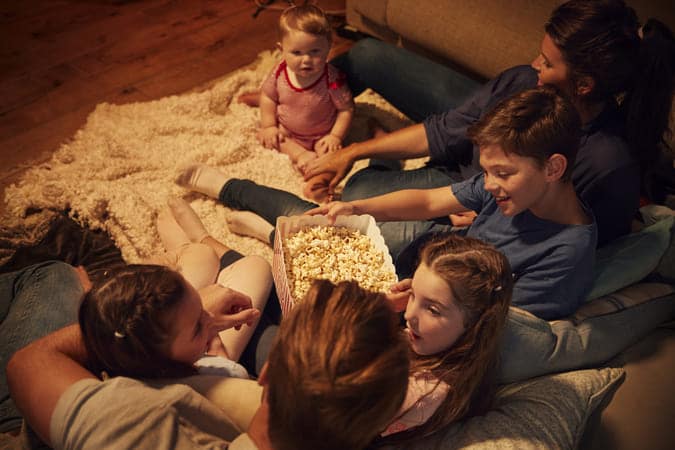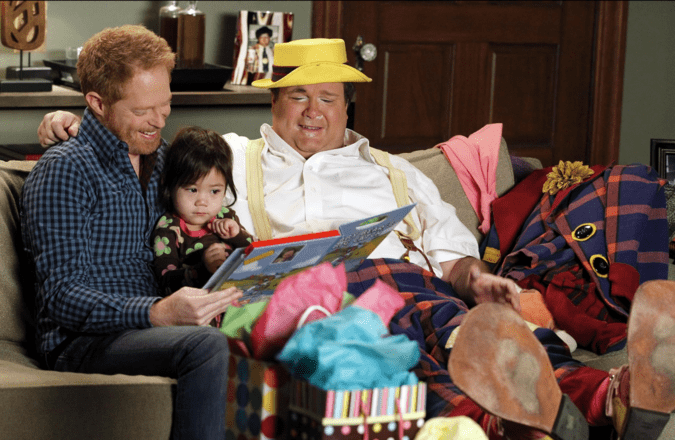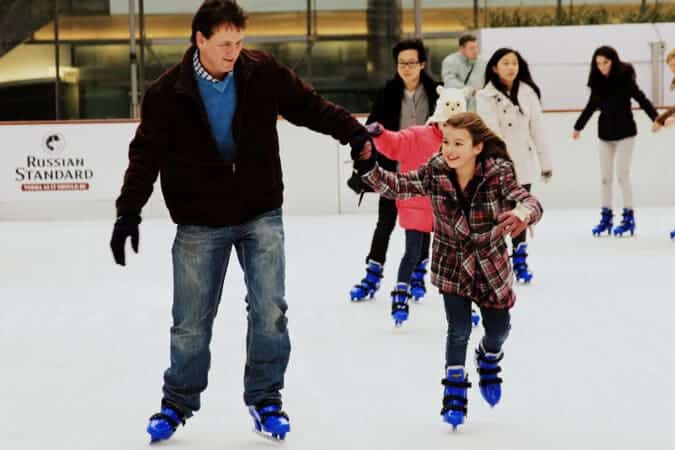Modern cinema has shaped our perception of the world around us. It is a reflection of society’s values, beliefs, and attitudes. And, of course, parents have played a significant role in the development of the film industry. More than just a cinematic experience, these moves and TV shows influence and reflect our perceptions and attitudes toward parenting and family dynamics.
Check out our thoughts as we analyze the impact of modern cinemas based on parents’ portrayal as fathers and mothers through the years.
Key Takeaways
- Modern cinema has evolved in its portrayal of parents, capturing the complexity of parenting.
- Parental portrayal varies across different genres, reflecting parents’ diverse challenges in real life.
- The portrayal of parents in modern cinema significantly impacts society’s perception of parenting and family dynamics.
The Evolution of Parental Portrayal

From 1950s to Now
The portrayal of parents in modern cinema has come a long way since the 1950s.
In the early days of cinema, parents were often depicted as strict and authoritarian figures, with little regard for their children’s feelings or opinions. However, as society has evolved over the years, so too has the portrayal of parents in film.
From the older generation between the 1960s and 1970s, there was a shift towards more realistic and relatable portrayals of parents. These movies tackled difficult issues and showed parents as flawed and imperfect individuals who were doing their best to navigate the challenges of marriage and parenthood.
Examples of movie titles are:
- Divorce and Mental Illness: Kramer vs. Kramer, Ordinary People
- LGBTQ+ Parenthood: Moonlight, Call Me By Your Name
- Immigrant Parents: The Farewell, Crazy Rich Asians
Throughout the years, there has been a trend towards more diverse and inclusive portrayals of parents in film.
Here’s a timeline providing a concise overview of the development of parental portrayals in modern cinema, tracing from the 1950s era to the present.
| Timeframe | Key Developments & Themes | Notable Examples or Changes |
|---|---|---|
| 1950s | Initial Depictions of Parents | Parents as strict and authoritarian |
| 1960s-1970s | Shift Towards Realistic Parental Portrayals | Tackled as flawed parents and imperfect individuals |
| Modern Era (Late 20th Century) | Rise in Media Consumption Patterns & Diverse Portrayals | Introduction of Netflix, Hulu |
| 2009-Present | Examination of Contemporary Family Structures and Dynamics through Popular Series | Diverse family units, varied parenting styles |
Influence of Media Consumption Patterns
The portrayal of parents in modern cinema is also influenced by media consumption patterns. With the rise of streaming services audiences now have access to a wider variety of content than ever before. This has led to an increase in demand for more diverse and inclusive portrayals of parents in film.
Some of the streaming platforms in our modern era include:
- Netflix
- Hulu
- Disney Plus
In addition, social media has given audiences a platform to voice their opinions and demand more representation in film. This has put pressure on filmmakers to create more nuanced and realistic portrayals of parents that reflect the diversity of modern society.
Impact of Social and Cultural Changes
As American culture has become more diverse and accepting of different family structures, filmmakers have responded by creating more inclusive portrayals of parents.
For example, the rise of single-parent households in the United States has led to an increase in films that explore the challenges faced by single parents.
These films have portrayed the struggles and triumphs of single mothers raising their children on their own. Great film examples of these motherhood movies are Boyhood and Lady Bird.
Overall, the evolution of parental portrayal in modern cinema reflects the changing social reality and cultural values of American society.
Parents in Different Genres
Different genres have their unique ways of presenting the portrayal of parents in modern cinema. Here are some examples of how parents are portrayed in different genres.
In Sitcoms
Sitcoms are a popular form of television entertainment that often focuses on the daily lives of families. The depiction of parents in sitcoms can vary depending on the show’s tone and style.
In some sitcoms, parents are portrayed as:
- Main protagonists
- Supporting characters
In the sitcom Modern Family, the parents are the main characters, and the show explores their relationships, different parenting styles and challenges. In contrast, in Friends, the parents are rarely seen, and when they are, it is usually in a supporting role.
In Disney Movies
Disney movies are known for their family-friendly content and often feature parents as central characters. However, the portrayal of parents in Disney films has evolved over the years.
Older Disney Movies – Good examples are Cinderella and Snow White where parents are often absent or dead, leaving the protagonists to fend for themselves.
Recent Disney Movies – Parents are more present and play an active role in the story, like in Moana and Frozen.
In Dramas
Dramas often explore complex family dynamics, and the portrayal of parents in these movies can be nuanced and multi-dimensional.
In some dramas, parents portray the following characters:
- Flawed individuals who struggle with their issues while trying to raise their children
- As a complex character who is both supportive and critical of her daughter’s choices.
- Overbearing or abusive, which can be challenging to watch but can also lead to powerful storytelling.
The depiction of parents in modern cinema can vary widely depending on the genre, tone, and style of the movie or TV show. However, regardless of how parents are portrayed, their role in storytelling remains crucial.
Stereotypes and Representation
Gender Roles
Parental portrayals in modern cinema often depict gender stereotypes in society, highlighting the “traditional nuclear family” as opposed to nonconventional configurations.
Social scientists have found that home, family life, and romance are three of the most important components of the way characters are presented.
Fathers are often portrayed as the breadwinners and disciplinarians, while mothers are depicted as nurturing and emotional. This represents traditional gender roles and can perpetuate harmful stereotypes.
However, there have been recent efforts to break away from these norms:
- Fathers as more involved and emotional
- Mothers as strong and independent
Race and Ethnicity
Despite efforts by the entertainment industry to improve diversity and representation in front of and behind the camera, screen media continues to fall short in its portrayal of diverse races and ethnicities.
When it comes to parental portrayals, there is a lack of representation of woman of color, particularly in leading roles. Even while parents are indicating they want more representation in the media that their kids consume, the slow pace of change in this area is a cause for concern.
The sad truth?
Media often portrays white families as the default, which can unintentionally send a message that they are the ‘norm’.
Single Parenthood
Single parenthood is another area where representation in modern cinema can be lacking.
- Single Mothers: They are often portrayed as struggling, self-sacrifice individuals and overwhelmed. Representation that single mothers are inadequate and need a man to complete their family.
- Single Fathers: Mostly depicted as heroic for taking on the role of both parents.
There have been recent efforts to portray single parents in a more positive light, highlighting their strength and resilience in the face of adversity.
Impact and Influence on Society

Modern cinema has a significant impact on society, particularly in the way it portrays parents and family structures. It shapes people’s attitudes and values toward family, children’s development, and the nuclear family structure.
On Family Structure
Movies that depict non-traditional family structures can help normalize these family structures and reduce the stigma associated with them.
- Single-parent families
- Same-sex parents
- Blended families
On Children’s Development
Children often look up to the characters they see on screen, and the way parents are portrayed in movies can shape their expectations of what a parent should be like.
Films that portray parents in a neglectful or abusive manner can adversely influence a child’s emotional growth, potentially fostering unfavorable perceptions of their parents.
On Attitudes and Values
The way parents are portrayed in movies can shape people’s expectations of what a parent should be like, which can have a lasting impact on children’s emotional development, school performance and their attitudes toward their parents.
Parents as authoritative figures: Like those who are always right can lead to unrealistic expectations of parents.
Parents as flawed individuals: Those who make mistakes can help people understand that parenting is a challenging job and that it’s okay to make mistakes.
Media’s Power and Responsibility

To create a positive impact, media outlets should focus on inclusion and diversity, and strive to create an accurate portrayal of parents. They also need to be aware of the potential negative effects that their depictions may have on society.
Inclusion and Diversity
Media outlets should strive to represent a wide range of parents including:
- Single parents
- LGBTQ+ parents
- Parents from different cultural backgrounds
This not only helps to create a more accurate representation of society but also helps to promote empathy and understanding among viewers.
Positive and Negative Portrayals
Positive depictions can help to promote healthy relationships between parents and their children.
Negative portrayals can perpetuate harmful stereotypes and contribute to negative attitudes towards parenting.
Media outlets can help to promote healthy relationships between parents and their children and contribute to a more positive and understanding society.
The Role of Media Outlets
The role of media outlets has the power to influence public attitudes towards parenting and can contribute to the development of positive or negative stereotypes. They have significant influence and responsibility when it comes to the portrayal of parents in modern cinema.
But how can medial outlets create a positive and accurate parent depiction?
- Focusing on inclusion and diversity
- Creating positive and accurate depictions
- Being aware of their potential impact
Modern Family: A Case Study

Modern Family, a beloved TV series since 2009, depicts three diverse family units.
The Pritchett-Dunphy-Tucker family is a blend of Jay with his second wife, Gloria, and her son Manny; Claire and her husband, Phil Dunphy, with their three children; and Mitchell Pritchett and Cameron Tucker, a same-sex couple raising an adopted daughter, Lily.
The series showcases varied parenting styles:
- Jay and Gloria’s authoritative approach
- Claire and Phil’s permissive style
- Mitchell and Cameron’s overprotective stance
While the show maintains some conventional gender roles, with men often as breadwinners and women managing the house, it also breaks these norms, presenting same-sex parents and step-families.
According to social learning theory, individuals learn by observing and imitating the behavior of others.
Modern Family can be seen as a model for families, as it portrays a range of different family structures and parenting styles. Ultimately, the show’s charm lies in its blend of humor and its challenge to traditional family stereotypes.
Frequently Asked Questions
What are some examples of movies that portray different parenting styles?
- Mrs. Doubtfire features a dad aiming for fun yet juggling duties.
- The Pursuit of Happiness presents a father working hard, and making tough choices for his son.
- Little Miss Sunshine, we can see parents with clashing parenting methods within a quirky family setting.
What are some movies that depict parent-child conflict?
- Lady Bird is a teenage girl who struggles to connect with her mother as she tries to find her own identity.
- The Squid and the Whale is about a family going through a divorce and the impact it has on the children.
- The Descendants depicts a father who has to reconnect with his daughters after his wife is left in a coma.
What are some funny parenting movies on Netflix?
- The Sleepover is a movie about two siblings who discover that their parents used to be spies.
- Father of the Year is a comedy about a dad who gets into a fight with his son’s friend.
- The Package is a movie about a group of teenagers who go on a camping trip, and one of them accidentally cuts off his penis.
What are the best movies about parenthood?
- Boyhood is about a boy’s life from childhood to adulthood.
- Parenthood depicts the challenges and joys of raising a family.
- Kramer vs. Kramer is a classic movie about a divorce and custody battle
- The Kids Are All Right is a movie about a same-sex couple raising their children.
What are some movies that portray young parents?
- Juno is a movie about a teenage girl who becomes pregnant and decides to give her baby up for adoption.
- Knocked Up is a comedy about a one-night stand that results in an unexpected pregnancy.
- Baby Driver is a movie about a young getaway driver who falls in love with a waitress and wants to start a family with her.
How are families portrayed in modern cinema?
Some movies depict families as happy and loving, while others show families that are dysfunctional and struggling. At the same time, many movies portray families as complex and multi-dimensional, with their own life, unique challenges and dynamics.
Final Thoughts about Parents in Modern Cinema

Over the years, modern cinema’s depiction of parental roles has transformed. While some films adhere to age-old stereotypes, many strive for a more genuine representation.
The impact of these portrayals can be profound: Films that depict healthy parent-child relationships can help normalize healthy family dynamics and encourage viewers to seek out similar relationships in their own lives. On the other hand, films that depict toxic or abusive parent-child relationships can help viewers recognize similar patterns in their own lives and seek help or support.
Yet, it’s vital to understand that movies are a fragment of a broader societal dialogue on parenting.
In essence, while cinema can shape our views on parenthood, it’s crucial to consume these portrayals discerningly, bearing in mind they’re part of an expansive cultural discussion on family.






